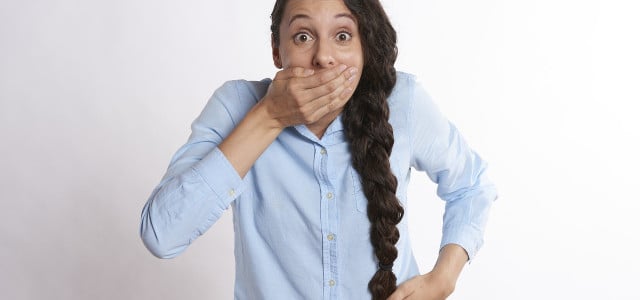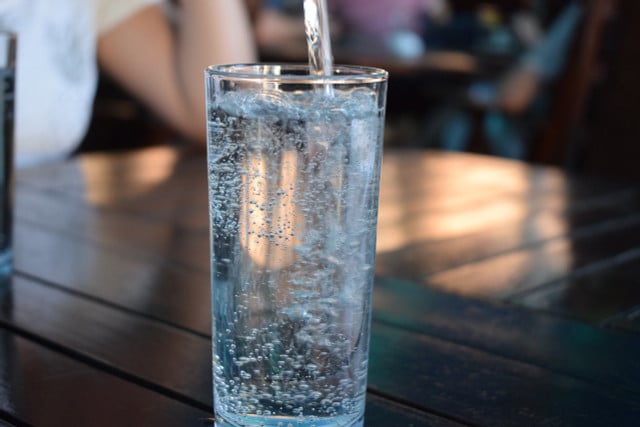
Hiccups are rarely really dangerous, but you still want to get rid of them quickly. Here you can find out what causes hiccups and how you can put an end to them.
Hiccups are caused by a spasm of the diaphragm: This muscle is one of the most important respiratory organs in the human body – when it contracts, we breathe in. If a spasm occurs, the diaphragm contracts involuntarily and quickly, closing the glottis in the larynx. This interrupts the flow of air and creates the “hiccup” sound.
Get rid of hiccups quickly: effective home remedies

(Photo: CC0 / Pixabay / Free Photos)
Hiccups usually only last a few minutes and then disappear on their own. Everyone has a different home remedy to get rid of hiccups. You’ve probably been asked to remember yesterday’s lunch, or someone has tried to scare you to stop the hiccups. The many tips and tricks are all creative, but not scientifically proven. Nevertheless, it’s worth a try to loosen the tense diaphragm:
-
Hold your breath. Breathe in as much air as possible and then hold it for a few seconds. Then let it out evenly – this will relax your diaphragm and the hiccups should disappear. However, as this exercise can quickly lead to dizziness, it should be done with caution, preferably slowly and while sitting.
-
Drink a glass of water in small sips, automatically holding your breath. If you let vinegar and sugar dissolve on your tongue and swallow slowly, it has the same effect.
-
Stick your tongue out or roll it backwards for a few breaths. This will allow the breath to flow more through the abdomen and become calmer.
-
Hold your nose, close your mouth and tense your breathing muscles as if you were breathing out. Gently hold the pressure for ten to 15 seconds. This is the so-called Valsalva technique, which can also be used to relieve pressure from the ears.
- Make sure you breathe calmly and evenly, especially when eating and drinking.
How do hiccups actually occur?

(Photo: CC0 / Pixabay / ExplorerBob)
Hiccups are caused by a spasm of the diaphragm. There are various causes for this:
- Temperature fluctuations in the stomach caused by hot or cold dishes and drinks irritate the stomach and diaphragm.
- Portions that are too large and eating and drinking too quickly overstretch the stomach – and this also affects the diaphragm.
- If you swallow a lot of air, for example through smoking or carbonated drinks, your stomach fills up quickly and irritates your diaphragm.
- When you are nervous, excited, anxious or stressed, you breathe faster and more irregularly. This can sometimes lead to the diaphragm cramping.
- During pregnancy, when the baby presses against the diaphragm.
When should you seek medical advice?
Usually hiccups disappear as quickly as they appear and are therefore not a problem. However, if they last for several days or occur very often, you should seek medical advice. Warning: If you suffer from headaches, nausea and dizziness in addition to hiccups, and possibly also have problems seeing or speaking, this could be a sign of a stroke. In this case, call an ambulance immediately.
Prevent hiccups
Everyone has probably had hiccups at some point and unfortunately they cannot be completely prevented. However, you can largely avoid them with these tips:
-
Take your time when eating and drinking. Chew your food thoroughly so you don’t swallow too much air and relieve the strain on your stomach.
-
Avoid very hot or very cold foods and drinks.
-
Do not chew a lot of gum as this can lead to swallowing air.
- Don’t eat beyond hunger. You can learn more about intuitive eating in this article: Intuitive Eating: How to Become More Mindful While Eating
Read more on Techzle\.com:
- Bloated stomach: These home remedies help with flatulence
- Activate self-healing powers: How to help your body
- Dry scalp: These home remedies help
Edited by Melanie Grünauer
** marked with ** or orange underlined Links to sources are sometimes affiliate links: If you buy here, you are actively supporting Techzle\.com, because we then receive a small part of the sales proceeds. More information.